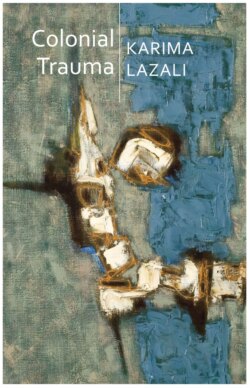Colonial Trauma

Реклама. ООО «ЛитРес», ИНН: 7719571260.
Оглавление
Karima Lazali. Colonial Trauma
Table of Contents
Guide
Pages
Series Title. Critical South
Colonial Trauma. A Study of the Psychic and Political Consequences of Colonial Oppression in Algeria
Copyright Page
Dedication
Epigraph
Foreword Mariana Wikinski
References
Notes
Introduction: The Difficulty of Acknowledging Colonial Trauma
The history of French colonization in Algeria: a blank space in memory and politics
A much-needed interdisciplinary approach
Note
1 Psychoanalysis and Algerian Paradoxes
Disarray of the private and public spheres
God’s reinforcement of failing institutions
The power of religion and the religion of power
The literary text and the invisible staging of power
The power of the “language, religion, and politics” (LRP) bloc as revealed by clinical psychoanalysis
The duplicity of subjects confronting censorship from the LRP
Abandoned citizenship and speech acts
Notes
2 Colonial Rupture
The colony: the rogue child of the Enlightenment
Colonialism’s destruction of social cohesion
A colonial republic divided, or the “duty to civilize [the] barbarians”
1945: a literature of refusal is born
Nedjma: an esthetic of colonial destruction?
Disrupting genealogical ties: the effect of “renaming” Algerians in the 1880s
Subjective catastrophes and the disappearance of the father as symbolic reference
Writing against anonymous filiation
Jean El Mouhoub Amrouche: a broken voice
Notes
3 Colonialism Consumed by War
1945–1954: the necessity of war
The impossibility of forgetting and madness, a “remedy” for disappearance
Silencing the unforgettable mutilation of bodies
Toulouse, 2012: the return of murder
Constructing the “nation”
The writer’s pressing need: transform disappearance into absence
Notes
4 Colonialism’s Devastating Effects on Post-Independence Algeria
The mutilated body of the colonized and the hunger for reparation
Colonial hogra and a frantic quest for legitimacy
The “orphaning” effect of colonialism and its impact
Further distortion of patronyms
Divested of a name: a form of colonial murder
Manufacturing erasure and denial under colonialism
From colonial trauma to social trauma
Notes
5 Fratricide: The Dark Side of the Political Order
The emergence of Algerian nationalist movements in the 1920s
The War of Liberation and an impossible fraternity
From parricide to fratricide
When the murders between brothers are dismissed …
Calling on the father
A gap in memory sets off an endless deadly battle
Notes
6 The Internal War of the 1990s
Reconsidering the LRP bloc
The tyranny and pleasure of power
The shift of 1988 and the experience of political plurality
An internal war of unprecedented violence
The curse of fratricide
The war comes home
A strange reversal in naming
Do freedom and terror go hand in hand?
Notes
7 State of Terror and State Terror
A clinical understanding of terror
The terrified subject’s self-elimination
Psychological terror is always political
Reconciliation: state terror?
When the state tries to make its practice of disappearance disappear
Notes
8 Legitimacy, Fratricide, and Power
Jugurtha: a fratricidal hero
Unpunished crimes within the Republic
The legitimacy the French conquest claimed for itself
The impassioned scene of coloniality
The specter of discord: el Fitna
Notes
9 Getting Out of the Colonial Pact
After Liberation, the indefatigable re-enactment of coloniality within subjectivities and the political order
Trauma as shelter and alibi
The brutalization of the living: the disappearance of children
The “bone seekers”: from children to fathers
Notes
Conclusion: Ending the Colonial Curse: Lessons from Fanon
The “colonial pact”: erasure of memory, disappearance of bodies, dispossession of existence
The mystical quality of the colonized
For a future liberation
Notes
Index
POLITY END USER LICENSE AGREEMENT
Отрывок из книги
The publication of this series is supported by the International Consortium of Critical Theory Programs funded by the Andrew W. Mellon Foundation.
Series editors: Natalia Brizuela and Leticia Sabsay
.....
It was Piera Aulagnier (1984) who described the state of alienation as the destination and destiny of the ego’s thinking function, of the ego as it seeks to eliminate all conflict and psychic suffering, including conflict between the ego and its ideals and between the ego and its desires. A step short of psychic death, the state of alienation presupposes that the subject has decathected from thought inasmuch as thought is experienced as a risk. The narcissistic contract, the apparatus of the LRP, the state of alienation, and the state of terror might thus converge in establishing the categories of persecutor and persecuted as ways of organizing intra-psychic life and the social bond; they might converge in making suspicion decisive for the subject’s relation to alterity, sustaining an effort to banish from the psyche all forms of conflict that might lead the subject to a confrontation with itself or to a confrontation with the world in which it lives. The forbidden governs both the subject’s knowledge of external reality and its knowledge of psychic reality, Aulagnier suggests.
In these pages, I have tried to locate the specificity of the colonial trauma that Lazali analyzes with such clarity and sensitivity, a trauma that inescapably affects subjectivity, the social bond, and the practice of psychoanalysis in Algeria. And yet for all the specificity of Lazali’s framework, throughout my reading of her extraordinary book I saw how close our experiences are to one another, as if we lived in the same social space and spoke the same language. If in all colonization we see an apparatus for suppression and the domination of difference at work, in this text, by contrast, we find an ethics of hospitality, an openness to the foreign and the other that gives us the sense of being sheltered and of offering shelter to an experience of contact with alterity. If this were to leave a lasting trace in our thought, it would undoubtedly work against the repetition of such a devastating history.
.....